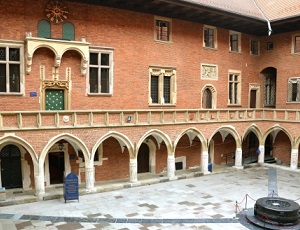
Following the success of first meeting organised in 2015, this international event is aimed to bring together scientists from the fields of physics, nuclear medicine and healthcare.
The 2nd Jagiellonian Symposium on Fundamental and Applied Subatomic Physics, organised by the Jagiellonian University, will take place on June 4 – 11, 2017 in Collegium Maius, the oldest building of the University, founded in the 14th century. Following the success of first meeting organised in 2015, this international event is aimed to once again bring together scientists from the fields of physics, nuclear medicine and healthcare. One of the main purposes of the Jagiellonian Symposium is to exchange experience and expertise gained by various institutions in the field of applied and fundamental nuclear as well as atomic and particle physics, medical imaging, radiotherapy and healthcare. The symposium will be a showcase for forefront experimental as well as theoretical developments, where the interplay between outstanding research and innovative concepts on the borderline between basic and applied science will be promoted.
Besides the main Symposium there will be three independent focused Satellite Meetings:
- Workshop on PET and MR Imaging (3 June 2017)
- AMADEUS Collaboration Workshop (4 June 2017)
- Workshop on Discrete Symmetries and Entanglement (11-12 June 2017)
The 2017 edition of the Jagiellonian Symposium will feature plenary talks by outstanding scientists and talented young researchers giving broad overviews that are attractive for PhD students, as well as short oral contributions. The scientific program covers the following topics:
- Lepton and hadron probes
- Exotic atomic matter
- Exotic hadronic matter
- Technologies in radiation detection
- Medical imaging technologies
- High performance signal processing and data analysis
- Neutron activation and positron lifetime technologies
- Radiation therapy technologies and effects of radiation on living organisms

